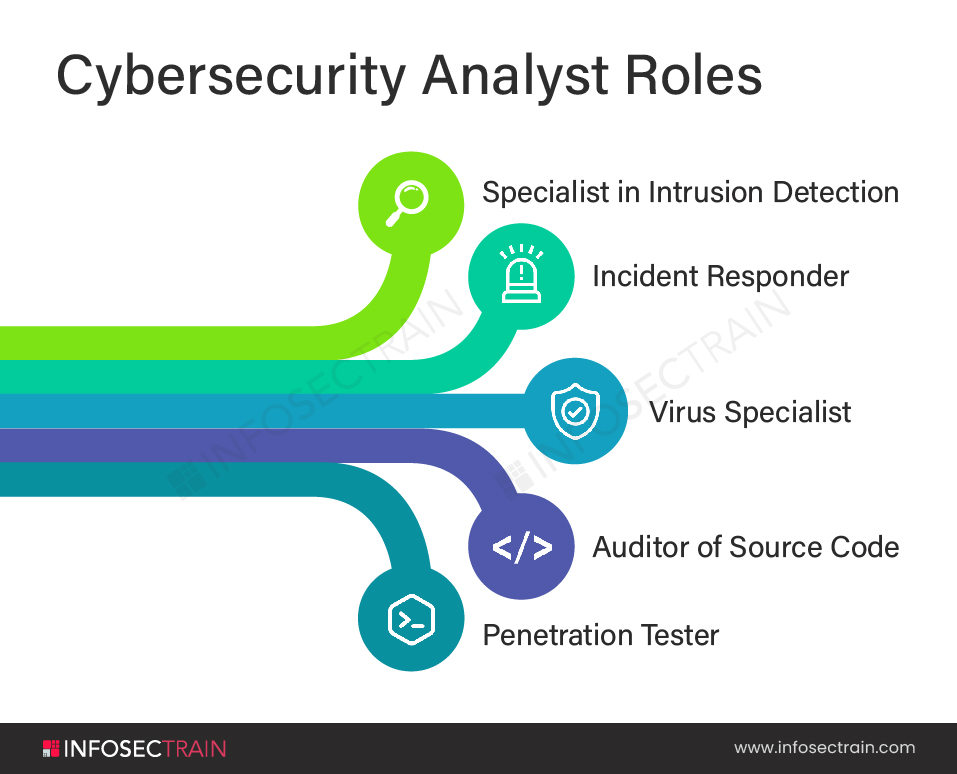Role and Responsibilities of Cybersecurity Analyst
Cybersecurity Analyst
Cybersecurity Analysts, also known as Information Security Analysts, secure sensitive data through a variety of techniques, technology, and resources.
As a Cybersecurity Analyst, you’ll defend IT infrastructure (such as networks, hardware, and software) from a variety of threats.
New responsibilities and titles are expected to arise as the Cybersecurity domain expands and develops, and the roles given to present titles are likely to evolve.

Cybersecurity Analyst Roles
Implementing firewall and encryption tools, identifying breaches or weak spots, analyzing IT trends, teaching the rest of the organization on security, and even modeling security attacks to uncover possible weaknesses are all part of the main Cybersecurity Analyst’s job role.
The following are some of the common roles:

- Specialist in Intrusion Detection: Large companies monitor networks, computers, and apps for events and traffic indications that indicate infiltration. Dictates the extent of harm caused by discovered attacks, determines how an attack happened, and suggests precautions to prevent future intrusions.
- Incident Responder: A team member detects and responds quickly to security risks and strikes such as malware and denial-of-service (DoS) attacks.
- Virus Specialist: Findings newly identified computer bugs and creating and building software to counteract them.
- Auditor of Source Code: Examines software source code for security flaws and vulnerabilities that hackers may use to gain unauthorized data access and system resources.
- Penetration Tester: Penetration testers search and identify vulnerabilities, and exploit them to prove that they are indeed flaws. In organizations, penetration tester’s large groups are called Red Teams.
Responsibilities of Cybersecurity Analyst
You’ll need to perform the following duties as a Cybersecurity Analyst:
- Stay up with the newest improvements in security and technology
- Investigate/evaluate new Cybersecurity risks and strategies for dealing with them
- Preparing for disaster recovery and build back up plans in case of a security compromise
- Keep an eye out for intrusions, attacks, and other unexpected, unapproved, or illegal behavior
- Analyze and test security products
- Develop new security mechanisms or improve old ones
- Discover upcoming threat patterns and vulnerabilities using powerful analytical tools
- Identify possible flaws and take steps to mitigate them, such as installing firewalls and encrypting data
- Security alerts are analyzed, and incident response is provided
- Monitoring identity and access management, including checking for unauthorized system users abusing permissions
- Create reports for technical and non-technical employees, as well as stakeholders
- Spam emails and ‘malicious’ activities should be monitored and responded to
Skills and Qualifications of a Cybersecurity Analyst
Cybersecurity Analysts must be critical thinkers and give great attention to details. They must also have the ability to come up with innovative methods to improve an organization’s present systems and networks. Companies often want a graduate degree in a computer-related field along with the following skills:
Analytical Thinking: Analytical thinking skills are required for Cybersecurity Analysts, who research computer networks and systems and identify potential risks to determine how security rules may be enhanced.
Problem-solving Abilities: Cybersecurity Analysts must react quickly to security warnings and patch any network faults, therefore they must be skilled in problem-solving.
Detail-oriented: Because certain attacks are harder to identify and may compromise a company’s data security, Cybersecurity Analysts have to be careful.
Critical Thinking: Cybersecurity Analysts observe threats and come up with innovative strategies to defend their company’s computer networks. So critical thinking abilities are required for them to address unexpected difficulties and think logically.
Technical Abilities: On a regular basis, Cybersecurity Analysts work with computer programs, networks, and systems, thus they must be good with technology in order to troubleshoot problems and quickly learn new software.
Cybersecurity analysts need to have the following technical skills
- Information systems
- Linux
- Penetration testing
- Cryptography
- NIST Cybersecurity Framework
- Vulnerability assessment
- Network security
- Python
- Project management
- Information assurance
How to be a Cybersecurity Analyst
If you want to become a Cybersecurity Analyst but aren’t sure where to begin, check out our article on ‘How to become a Cybersecurity Analyst?’.



 1800-843-7890 (India)
1800-843-7890 (India) 
